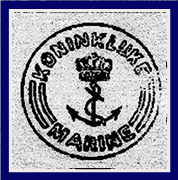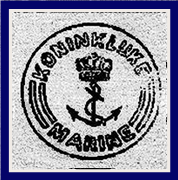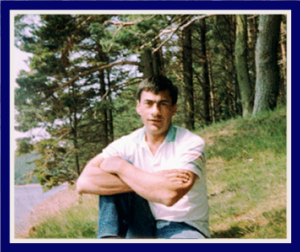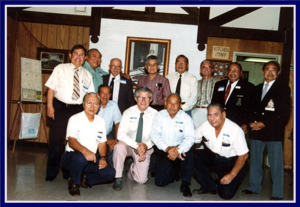
DUTCH INDONESIAN MEMOIRS 1941-1948
KONINKLIJKE MARINE Royal Netherlands Navy
MLD Marine Luchtvaart Dienst
or
DNAS Dutch Naval Air Service
KONINKLIJKE LUCHTMACHT Netherlands Royal Air Force
HANGER 6 Naval Airstation Morokrembangan
1. A story of Dutch-Indos during WWII
In the beginning
This is the personal story of four men but with them there were many.
A story of how boys and young men were taken from their Fatherland, under attack from invaders, to fight for the freedom of their Motherland on the other side of the world. It tells of their loyalty, devotion to duty, honour and pride.
How, through adversity, they grew up and became men, that a nation could be proud of.
It portrays how four men went their separate ways, to different theaters of war and how they once again met to share in the post war agony of political upheaval.
When all they wanted to do, was just go home.
We hope you find this informative and educational.
Royal Netherlands Navy

Official stamp found on
discharge papers 1949
GENEALOGY. What is it? The study of genes. A list of x and y chromosomes passed down from parents to children? Who you are directly or indirectly related to? Or is it a list of circumstances, which effect people's lives and character, to make them in turn effect their offspring or the people around them.
INDISCHE / INDO By descent. EURASIAN By definition. DUTCH By birth.
ENGLISH By upbringing. LOOKING For my roots.
I had from an early age always thought how complex my life was. Most of my peer group were white and English. They made sure that I knew I was different and for the whole of my school life I suffered the indignities of racial name calling with quiet resignation never telling my parents. I can recall in great detail much of my school life but for all the wrong reasons. Although at times I despised them, in other ways I was envious, as they had families that had lived in the small town I grew up in for many years. Everyone seemed to be related or to know someone who new them. Aunts, Uncles, and Grandparents in double figures while I had one aunt who I rarely saw.

When I first started looking aged 43
When I was very young, I grew up knowing nothing about my parents’ history or background. Being then in a post war era one was not encouraged to ask questions of ones’ parents. "Be seen but not heard" as the proverb says meant just that.
At the age of about nine I once asked my father, since my friend would tell us stories of his fathers’ time in North Africa "Dad what did you do in the war"? Only to get the answer "Why do you want to know. It doesn't concern you". So that was the end of that. You never asked the same question twice of him. That was an unwritten rule and the quicker you realise that the better it was for you. Once said never repeated.
So I grew up, moved out, married and had children still knowing absolutely nothing.
What I did know was I was born in Zeist Netherlands and raised in England.
My father was a man of very few words when I was growing up. He worked for years on end on different contract sites around the country and would come home after weeks away just for the weekend. He was not an approachable man, private yes, you never dared to asked him personal questions, very strict, unbending, and with his own code of ethics but above all proud.
He was born in Grissee, (Grisik), Java, Indonesia to a privileged Dutch-Indonesian father and mother. He had left the Island as a seventeen-year-old naval cadet in March of 1942 along with many of his age group. Leaving behind the country and home he was never to see again. He sailed halfway round the world through enemy controlled waters, having en-route suffered the indignities of apartheid in South Africa. To end up, being a coloured man in a white mans' country, whose language he hardly spoke, fighting for a country he had never set foot in.
During this time, he met my mother a WAAF who was a couple of years older than my father but who also had a lonely childhood. The fourth child of five, with three older brothers and her younger sister, she lived on a farm where her father George King, was a farm labourer. As a Private in the Bedfordshire Regiment, he married in 1915 aged 30 to Susan Webb aged 23.
By the time my mother was seven, I found Susan had died of breast cancer in the asylum she had been placed in. Not because she was insane but because the County thought that was the place for her so she earned her bed doing laundry, cooking or whatever work they needed doing. When she passed away after a year and a half, she was buried with a small, numbered iron cross in what became an unmarked grave yard.
My mother and her sister (and 3 brothers) had been taken into care by Barnardo's. Here she lived until old enough to work, when she was "employed" in Norfolk as a nanny to the children of a doctor until the war came and she joined up on 22 May 1941. From the age of seven, apart from one photograph during the war she was to, never see her brothers, father or the place she was born again.
At the end of the war my father was shipped to the Netherlands where he fought to bring my mother and at the time my brother Maurice. Over the next few years my sister and I were born in Zeist and Doorn near Utrecht, but things were not all rosy for the Dutch Indonesian "immigrant".
In the Netherlands political upheavals in Indonesia were growing with the claims for Indonesian independence. Fine in the Netherlands if you were born there and had skin to match, but not for someone wasn't and didn't. Even if you were brought up as a Dutchman, believed you were Dutch, spoke Dutch, had a Dutch father and had just spent seven years fighting and serving the country you called the Motherland.
So in 1953 just after I was born we arrived back in England a country supposedly crying out for skilled men to rebuild the country. A country my parents had fought for but at the time had an element that was no better than where they had just left.
All through the 50's,60's and 70's my father suffered the indignities of colour bar, hotel rooms and Boarding Houses with rooms advertised as vacant then suddenly not being so and racial abuse aimed at both parents for being of a mixed marriage. He was never promoted to a position over other men as he said they would resent taking orders from a coloured man. Undeterred together they got through it and stayed together and although, I as a child never saw them ever kiss each other. I can only presume that it was their unseen deep-down enduring love for each other that got them through it and kept them together.
As I said my father was a private man and rarely spoke about his life in Indonesia in front of us, "the children". I think it hurt to much, but on occasions or off-guard moment, I would catch the end of a conversation in English with my mother, about this person or that and what they used to do. Precious moments, as father would talk in Dutch if the conversation was meant to be private.
It was like a brush stroke on an empty canvass. Painting a small section but never enough to complete the picture. A little like looking from the outside, into an empty house, through a small hole in a dirty window. You rub the window to get a better look, but all the dust is on the inside.
So here I was a half white, half coloured, half Dutch Indonesian, half English, half Catholic and half Church of England, born in the Netherlands raised in England, of Dutch nationality not speaking the language. When I once asked him about teaching me. His snapped words were "What do you want to learn that for"? I could feel some deep-down resentment inside him, and I never ever asked him again.
That is how it is for me and so with my trusty computer and the Internet, I decided back in 1990 to try and find out who I really am and to make sure that my children know who they are although, they now have a half English, half American Italian, to add on to their pedigrees, sorry kids! It has been a long hard road, with most records being in Dutch and held in the Netherlands. A lot of information not recorded, unknown living relatives scattered around the world, who's relationships in the family were not known, first be found. As to my mother I found her siblings although it has taken me over twenty-five years as all I had was her maiden name Date of birth ( both wrong ) and the village she had lived in.
Back in those days I used an IBM Dos 360 dial up modem and the BBS system to research. Then in 1996 I bought an IBM Aptiva with the then new Windows 3.1. Those were the heady days of the early the Internet
Very slowly over the next few years I learned more. Trawling the web, News groups, Family History sites, War pages and the sadly now defunct Webrings.
Then came the breakthrough when I posted does anybody know my father's name and I got a positive response from a Dutch veteran in California. He gave me a name and then another who was with my father in Indonesia.
I have tried to make this site as easy as possible to navigate. Mainly for ease and for educational reasons. Asking pupils of a similar age to put themselves in these peoples' shoes as if it was happening to them. So I have repeated the same format again. I hope you ask similar questions yourselves.
"Before you judge a man walk a mile in his shoes"
Veterans celebrating Queens Day in California at their 55-year reunion.
6 September 1996

Back row 2nd left Pieter Pijpaert, 3rd left John Franken, 1st right Ben Portier 2nd right Frank Rugebregt
Front row Middle Theo Snellen Von Volenhoven, Far right Izo Hultz